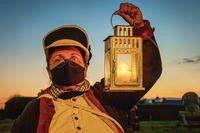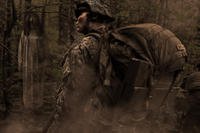Richard Sisk has more than 45 years of journalism experience in reporting and editing in the U.S. and abroad for United Press International, the New York Daily News and now for Military.com. He has covered police beats, the courts, transportation and politics in New York City and Washington, D.C., and had numerous assignments in the Middle East, Europe and Latin America. He can be reached at Richard.Sisk@Military.com.
The opinions expressed in this op-ed are those of the author and do not necessarily reflect the views of Military.com. If you would like to submit your own commentary, please send your article to opinions@military.com for consideration.
Back in February 2013, Colin Powell was at the State Department to preside over the official unveiling of the portrait commemorating his time as secretary of state.
But, first, the retired general and former Joint Chiefs chairman wanted to talk about hot dogs.
"I'm a New York guy," said Powell, who grew up on curving "Banana Kelly" Street in the South Bronx. "Whenever I go back to New York, I love walking up one of the great avenues, usually Park, and admiring the buildings and see[ing] all of humanity going by.
"And I always stop at one of the numbered cross streets to buy a hot dog from the hot-dog peddler, one of those New York dirty-water dogs that so many of you are familiar with," he continued. "But it has to have the mustard, the Sabrett mustard, and the red-onion relish. That's what makes a New York hot dog. And I do it all the time. And not too long ago, I was walking up Park Avenue. And I was going to follow my traditional pattern of going over to the hot-dog peddler ..."
But the vendor wouldn't take his money.
He was an immigrant, now a citizen, and he knew that Powell's parents were immigrants from Jamaica. Powell said the guy told him, "You can't pay me. I've already been paid. America has paid me. I'm here."
Powell was told by a bystander at the State Department event that he had it all wrong: A New York City dog minus the sauerkraut ain't a real city dog, they opined. But he was firm on the relish -- the kraut was out, at least for him. And then he cracked up.
Giving a discourse on hot dogs at a formal State Department event was typical of Powell, who mixed an innate sense of fierce pride with a sometimes self-deprecating attitude that communicated an air of accessibility, despite the high positions he held.
He could admit mistakes, although that might take a while, as he did about being wrong on the presence of weapons of mass destruction in Iraq. And he didn't hold a grudge, although that also might take a while.
Powell famously had a blowup with Hillary Clinton over her emails but went on to support her for president over Donald Trump.
He also had practical sense in his makeup, an ability to see where others wanted to go or could be convinced to go, that made him a leader despite his admittedly "C" average at City College in New York.
Powell carried that common sense with him through two tours in Vietnam, the rebuilding of the Army after the war, and his rise to chairman of the Joint Chiefs. He was the first person to hold that position to come from the Reserve Officers' Training Corps, or ROTC, as opposed to the "ring knockers" of West Point or the other service academies.
He was a car nut, rebuilding old models, and always wanted to be at the wheel -- to the dismay of his drivers when he was the top uniformed officer in the military.
He loved telling the story of ordering his driver into the back and driving up to the gate himself on a trip to the CIA. As related by Powell, the flabbergasted guard at Langley could be overheard telling a buddy: "I don't know who that guy in the back is, but he must be somebody really big. Colin Powell's his driver."
Powell brought to the positions he held a sense of the limitations of power and his ability to control events, and he spoke to those limitations on the way to address the Harvard Business School in June 1993.
The military at the time still had a ban on LGBTQ Americans serving in the ranks, and there was concern that Harvard, which was a hotbed of anti-war protest during Vietnam, might be confrontational about Powell's appearance. But the future masters of the universe at the Business School gave him a rousing welcome.
Somebody in a scrum of reporters, looking for a superlative out of Powell, asked his opinion on the best or worst thing about being Joint Chiefs chairman.
Powell said the worst thing was knowing that right then somebody, somewhere, in the chain of command was doing something so stupid -- something that might even start a war -- that it defied belief, "and there's not a damn thing I can do about it."
In November 2015, Powell was back at Harvard, this time for a panel discussion at the Law School, where he spoke about his 13 rules for great leadership. One of the rules was, "It ain't as bad as it looks. It will look better in the morning."
Powell added a caveat: Sometimes, it's worse in the morning, but you have to stay positive despite the mess. "You have to keep your team up," he said.















